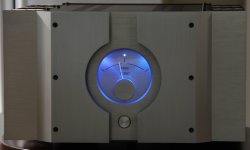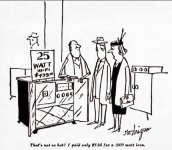There is no such thing as a best amp in the world.When we search for the holly grail, we google "best amp in the world", "best sounding amp ever!".
Just because the straight wire zero distortion, zero coloration theory is all wrong. Even the shortest straight wire produces distortions and colorations.
In practise, the human senses are highly individual, subjective.
This is a stupid goal, a stupid question, because no one would ask for the best steak in the world or the best wine in the world. All those experiences have to be tasted to judge and everyone will judge different.
You should have a clue for your goals in audio. If you think that zero distortion is attractive, go for such an amp. If you like tube sound, go for a tube amp.
If you like K2 distortions, go for single ended.
Thats how someone chooses, because he knows his preferences.
And preferences can change with individuals, sometimes they change with daytimes or seasons or moods. So for every mood a different amp. How about that?😀
There is no such thing as a best amp in the world. So for every mood a different amp. How about that?😀
Hehe 😀
Wish there were cheap wine that taste good. As long as we can set the criteria, there is always best thing. Setting up the criteria for amp is I think easier than for the wine (Wine experts will disagree).
A reasonable reason to opt for Class A amplification could be to achieve smooth transitions, evading the nasty switching bursts. Nothing is in itself beneficial so a smooth transition is not generally an objective. The switching-mode pulsating power supply, also called Buck converter (or bucks bunny converter) is anything but smooth.
Likewise, digital transmission consists of discrete switched pulses. A pulse arises in response to a switching action. hpro`s assumptions are fundamentally correct.
Instead of "analog", "continuous" would be a more appropriate word here. Nature constitutes a continuous system where gaps, discontinuities, delays, periodicities can never occur. The audio signal is more naturally transmitted in a continuous technical fashion.
Likewise, digital transmission consists of discrete switched pulses. A pulse arises in response to a switching action. hpro`s assumptions are fundamentally correct.
Instead of "analog", "continuous" would be a more appropriate word here. Nature constitutes a continuous system where gaps, discontinuities, delays, periodicities can never occur. The audio signal is more naturally transmitted in a continuous technical fashion.
Thanks for your answer.
Continuous is the better word indeed.
I believe that Nelson Pass used a similar analogy for single-ended amplifiers and sound travelling to air I believe,
Continuous is the better word indeed.
I believe that Nelson Pass used a similar analogy for single-ended amplifiers and sound travelling to air I believe,
Bob Widlar at National is famously quoted as saying
"When a design is ready for fab, they send it over to Digital. If they
can't make it, then it's Analog."
😉
"When a design is ready for fab, they send it over to Digital. If they
can't make it, then it's Analog."
😉
This is the roof over my workshop, and I use LED lights:
That's brilliant!! I myself have 5.3kW (3.2kW currently installed) of panels with 35kWh of battery storage for cloudy days. Mine is more of a hobby though.
I also have some panels dedicated to DC for amplifiers. Very quiet but daytime only.

It's probably the batteries, the old problem of retaining current, that will constitute the main problem for using solar energy. I'm not an expert in this field but producing and disgarding them seems critical ecologically.
Please correct/enlighten me on that.
Just finished reading the 21 page owners manual of the first series of X amplifiers. It's proza, so witty and informative that only on the base of that alone you want such an amplifier.
It's probably the batteries, the old problem of retaining current, that will constitute the main problem for using solar energy. I'm not an expert in this field but producing and disgarding them seems critical ecologically.
Please correct/enlighten me on that.
It really depends on your choice of storage and what your needs are. For home use a vast majority of the time, weight and volume are not constraints. In my case it wasn't, and for that reason I didn't mind good old fashioned lead acid wet cells because of their recyclable factor. Where I am its "easier" to recycle lead acid than lithium ion as the support network to recycle lead acid where I am is far more mature (we get credit for our spent batteries when we replace them). The only real annoyance is its a pain to transport them when each 6V battery weighs 57kg, but the manufacturing plant itself is in my province so its not a horrible drive to get them.
Apologies in advance for the threadjack.
No your comment on solarpower is okay because I asked to get enlighted.
I hear dreadfull stories about those Lithium mines in Chili I believe destroying the land just like brown coal day-mining.
If lead-acid can be recycled without to much pollution and hassle it's great of course.
I hear dreadfull stories about those Lithium mines in Chili I believe destroying the land just like brown coal day-mining.
If lead-acid can be recycled without to much pollution and hassle it's great of course.
Would a PassLabs X-350 (the original not the .5 or .8) still be an interesting option to get into highbiased amplifiers?
According to the manual this amp consumes 600 Watts when idling so a great portion of its powerrange is Class A I presume.
https://www.diyaudio.com/forums/attachment.php?attachmentid=937708&stc=1&d=1617209535
According to the manual this amp consumes 600 Watts when idling so a great portion of its powerrange is Class A I presume.
https://www.diyaudio.com/forums/attachment.php?attachmentid=937708&stc=1&d=1617209535
Attachments
Last edited:
@ RobertS61
In a Mr.Pass article from the year 1978 you find chapter with the futuristic title " Heat and Ecology ".
Yes 43 years old message , and you can learn more why class A is favored
https://www.firstwatt.com/pdf/art_a40.pdf 🙂 Best regards
In a Mr.Pass article from the year 1978 you find chapter with the futuristic title " Heat and Ecology ".
Yes 43 years old message , and you can learn more why class A is favored
https://www.firstwatt.com/pdf/art_a40.pdf 🙂 Best regards
Attachments
@ RobertS61
In a Mr.Pass article from the year 1978 you find chapter with the futuristic title " Heat and Ecology ".
Yes 43 years old message , and you can learn more why class A is favored
https://www.firstwatt.com/pdf/art_a40.pdf 🙂 Best regards
Very nice contribution indeed! Start reading immediately.
Thanks the ecological part:
"...the ecologically oriented audiophile may wish to operate his class A amplifier only during the winter, when he would otherwise be using his heater, and revert to a class AB design amplifier during the summer."
Good thinking!
Last edited:
@ RobertS61
Want build a class D Gain Clone amp ? Mr. Pass
 supersymmetry SUSY amplifier schematic
supersymmetry SUSY amplifier schematic
was given to audio hobby amateurs in this thread GC SuperSymmetry Have Fun
Want build a class D Gain Clone amp ? Mr. Pass

 supersymmetry SUSY amplifier schematic
supersymmetry SUSY amplifier schematicwas given to audio hobby amateurs in this thread GC SuperSymmetry Have Fun

Would a PassLabs X-350 (the original not the .5 or .8) still be an interesting option to get into highbiased amplifiers?
According to the manual this amp consumes 600 Watts when idling so a great portion of its powerrange is Class A I presume.
https://www.diyaudio.com/forums/att...1617209535-class-benificial-passlabs-x350-jpg
nope
they're all venerable, ancient relics, no good
send them all to OPLDF, for proper disposal

The LM3886, on which the gainclone is based, is a class AB chip amp, not class D...Want build a class D Gain Clone amp ?
- Home
- Amplifiers
- Pass Labs
- Class A in itself benificial?

